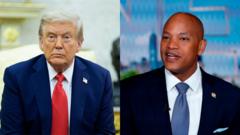Amid ongoing tensions, President Donald Trump has threatened to deploy troops to Baltimore in response to a challenge from Maryland Governor Wes Moore, who invited him to join a "safety walk" in the troubled city. Trump's comments, delivered via social media, hinted at military intervention similar to recent actions taken in Democratic-led cities in an effort to address crime, stating, "If Wes Moore needs help, I will send in the 'troops,' which is being done in nearby DC, and quickly clean up the Crime." This approach has stirred controversy, raising fears among Democrats about the military's role in domestic law enforcement.
The president's remarks come as he continues to mobilize National Guard troops across the country, with reports suggesting nearly 1,700 servicemen are set to be activated in 19 states soon. Governor Moore, who has been critical of Trump's law enforcement strategy, described the president’s threats as “tone deaf” and disconnected from the realities faced by Baltimore residents, stating, “They have not walked our streets... they are making these repeated tropes about us.”
Trump’s comments were made after Moore sent him a letter that the president described as “nasty” and “provocative.” He implied that it would be more effective for Moore to address the crime issues directly before he arrived for a walk in the city.
Despite Trump's claims of heightened safety due to military presence in Washington DC, crime data suggests a decreasing trend in violence. Statistics from the Metropolitan Police Department indicate that violent crime has reached its lowest levels in three decades, with overall crime down 26% compared to the previous year.
Moreover, Trump's threats have drawn widespread condemnation from Democratic leaders across the country, including responses from Illinois Governor JB Pritzker and House Minority Leader Hakeem Jeffries, who argue that such troop deployment constitutes an abuse of power. They warn that the President is leveraging inflated crime fears to create a crisis where none exists, citing Baltimore's significant drop in homicides.
An opinion poll conducted by the Washington Post revealed substantial opposition to Trump's proposed troop deployments, with nearly 80% of city residents rejecting both the presence of federal officers and National Guard forces in their neighborhoods. As discussions continue, the implications of military intervention in American urban centers remain a contentious topic, echoing the broader national conversation about crime, safety, and the role of military forces in civilian law enforcement.
The president's remarks come as he continues to mobilize National Guard troops across the country, with reports suggesting nearly 1,700 servicemen are set to be activated in 19 states soon. Governor Moore, who has been critical of Trump's law enforcement strategy, described the president’s threats as “tone deaf” and disconnected from the realities faced by Baltimore residents, stating, “They have not walked our streets... they are making these repeated tropes about us.”
Trump’s comments were made after Moore sent him a letter that the president described as “nasty” and “provocative.” He implied that it would be more effective for Moore to address the crime issues directly before he arrived for a walk in the city.
Despite Trump's claims of heightened safety due to military presence in Washington DC, crime data suggests a decreasing trend in violence. Statistics from the Metropolitan Police Department indicate that violent crime has reached its lowest levels in three decades, with overall crime down 26% compared to the previous year.
Moreover, Trump's threats have drawn widespread condemnation from Democratic leaders across the country, including responses from Illinois Governor JB Pritzker and House Minority Leader Hakeem Jeffries, who argue that such troop deployment constitutes an abuse of power. They warn that the President is leveraging inflated crime fears to create a crisis where none exists, citing Baltimore's significant drop in homicides.
An opinion poll conducted by the Washington Post revealed substantial opposition to Trump's proposed troop deployments, with nearly 80% of city residents rejecting both the presence of federal officers and National Guard forces in their neighborhoods. As discussions continue, the implications of military intervention in American urban centers remain a contentious topic, echoing the broader national conversation about crime, safety, and the role of military forces in civilian law enforcement.





















